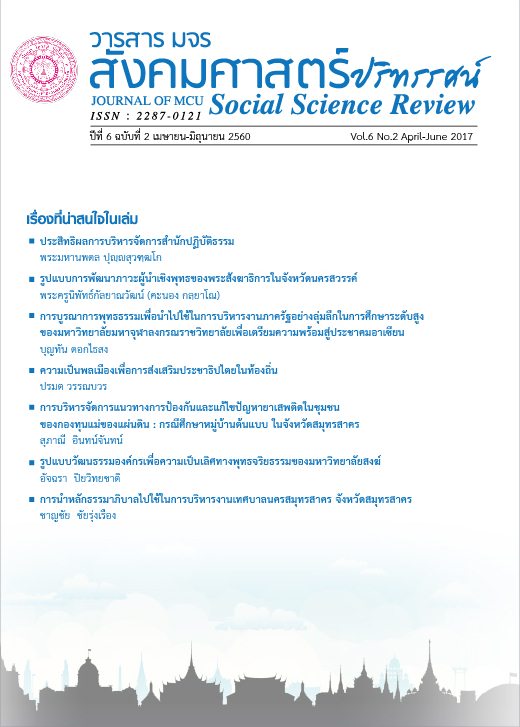ประสิทธิผลการบริหารจัดการสำนักปฏิบัติธรรม
คำสำคัญ:
ประสิทธิผล การบริหารจัดการ สำนักปฏิบัติธรรมบทคัดย่อ
การวิจัยครั้งนี้มีวัตถุประสงค์ (1) เพื่อศึกษาประสิทธิผลการบริหารจัดการสำนักปฏิบัติธรรม (2) เพื่อศึกษาองค์ประกอบที่ส่งผลต่อประสิทธิผลการบริหารจัดการสำนักปฏิบัติธรรม
(3) เพื่อศึกษาแนวทางการส่งเสริมประสิทธิผลการบริหารจัดการสำนักปฏิบัติธรรม
การวิจัยเป็นแบบผสานวิธีทั้งการวิจัยเชิงคุณภาพและการวิจัยเชิงปริมาณ สำหรับการวิจัยเชิงคุณภาพ ผู้วิจัยได้ศึกษาจากเอกสาร การสัมภาษณ์เชิงลึก ผู้ให้ข้อมูลสำคัญ จำนวน ๑๘ รูปหรือคน และการสนทนากลุ่มเฉพาะ ผู้ทรงคุณวุฒิ จำนวน 9 รูปหรือคน โดยการวิเคราะห์ข้อมูลแบบอรรถาธิบายและพรรณนาความ สำหรับการวิจัยเชิงปริมาณ ผู้วิจัยแจกแบบสอบถามกับกลุ่มตัวอย่าง จำนวน 181 รูปหรือคน จากประชากร 340 รูปหรือคน วิเคราะห์ข้อมูลโดยใช้โปรแกรมประยุกต์เพื่อการวิจัย โดยใช้สถิติพรรณนา ได้แก่ ค่าความถี่ ค่าร้อยละ ค่าเฉลี่ย และค่าเบี่ยงเบนมาตรฐาน
ผลการวิจัยพบว่า
- ประสิทธิผลการบริหารจัดการสำนักปฏิบัติธรรมประกอบด้วย (1) ด้านการวางแผน กำหนดบุคคลตามความรู้ความสามารถ ตระเตรียมความพร้อมอาคารสถานที่สวดมนต์ นั่งสมาธิเจริญจิตตภาวนา เดินจงกรม วางแผนสถานที่ฉันภัตตาหาร โต๊ะตู้ เก้าอี้ ภาชนะสะอาดเพียงพอ สถานที่หลับนอนสะอาดเพียงพอ ห้องอาบน้ำห้องสุขาสะอาดเพียงพอ สถานที่จอดรถสะอาดเพียงพอ ดูแลรักษาวัสดุอุปกรณ์ให้ดี วางแผนงบประมาณในสำนักปฏิบัติธรรมให้เหมาะสมทั้งระยะสั้นและระยะยาว ทั้งเชิงรุกและเชิงรับ (2) ด้านการจัดโครงสร้างสำนักปฏิบัติธรรม กำหนดตำแหน่งหน้าที่ความรับผิดชอบในการงาน ได้แก่ ประธานอำนวยการ คณะกรรมการบริหาร หัวหน้าแผนกปฏิบัติธรรม หัวหน้าแผนกอบรมศีลธรรมและกิจกรรมพิเศษ หัวหน้าแผนกอาคารสถานที่ หัวหน้าแผนกอาหารและเครื่องดื่ม หัวหน้าแผนกรักษาความความสะอาดและความปลอดภัย และเลขานุการสำนักปฏิบัติธรรม มอบหมายและเปลี่ยนแปลงบุคลากรแต่ละคนให้เหมาะสม ประชุมสัมมนาตามวาระโอกาสเพื่อรับฟังความคิดเห็น และวิธีการแก้ไขปัญหาอุปสรรคให้เหมาะสม (3) ด้านการชี้นำเพื่ออำนวยความสะดวกแก่ผู้มาปฏิบัติธรรม มีคู่มือการปฏิบัติธรรม โครงการประจำเดือนและประจำปี ส่งเสริมบุคลากรให้มีความรู้ความสามารถ มีจิตอาสาคือการปฐมนิเทศ ฝึกอบรมพัฒนา ประเมินผลงาน เพื่อสร้างขวัญและกำลังใจ ส่งเสริมกระบวนการทำงานที่เหมาะสมกับสำนักปฏิบัติธรรม ดำเนินการตามโครงการปฏิบัติธรรมด้วยการจัดทำงบประมาณ และการประสานงานกับหน่วยงานอื่นๆ (4) ด้านการควบคุม ตรวจตราสำนักปฏิบัติธรรมตามกฎระเบียบ จัดทำเอกสารสรุปผลการดำเนินการประจำเดือนและประจำปี ดูแลการรักษาความปลอดภัยทั้งภายในสำนักปฏิบัติธรรม กำกับดูแลการเงินงบประมาณ ส่งเอกสารหลักฐานให้ผู้บริหารทราบตามกฎระเบียบ ประจำเดือนและประจำปี ตรวจสอบวัสดุอุปกรณ์ อาคารสถานที่ให้เป็นที่สัปปายะแก่การปฏิบัติธรรมทั้งระบบน้ำประปา ไฟฟ้า ห้องสุขา ห้องนอน ห้องปฏิบัติธรรม และสิ่งจำเป็นอื่นๆ ที่เกี่ยวข้องกับสำนักปฏิบัติธรรม ตรวจสอบวิธีการทำงานทั้งบุคลากร ครู อาจารย์ เจ้าหน้าที่ และผู้ปฏิบัติธรรม
- 2. องค์ประกอบที่ส่งผลต่อประสิทธิผลการบริหารจัดการสำนักปฏิบัติธรรม คือการบริหารตามหลักอิทธิบาท 4 มีความสำคัญอย่างยิ่งต่อการบริหารสำนักปฏิบัติธรรม เพื่อเป็นเครื่องจูงใจบุคลากรให้เกิดจิตอาสา (1) ด้านฉันทะ คือเลือกใช้บุคลากรให้เหมาะสมกับงาน ส่งเสริมให้บุคลากรทำงานเพื่อถวายเป็นพุทธบูชา ถวายเป็นพระราชกุศล สร้างแรงจูงใจแก่บุคลากรมีจิตอาสา (2) ด้านวิริยะ คือส่งเสริมความรับผิดชอบ เพิ่มพูนความรู้ ฝึกอบรมวิธีการทำงานแก่บุคลากรให้มีจิตอาสาดูแลการพัฒนาสำนักปฏิบัติธรรมให้เป็นไปตามเป้าหมาย (3) ด้านจิตตะ คือตั้งใจพัฒนาสำนักปฏิบัติธรรม คิดวิเคราะห์ข้อมูลแบบโยนิโสมนสิการ มีสติไตร่ตรองการทำงาน คอยดูแลเอาใจใส่ผลงานตามนโยบายและแผนงาน (4) ด้านวิมังสา คือพิจารณาเหตุผล วิเคราะห์จุดเริ่มของการทำงาน สามารถสร้างจุดแข็งและหาจุดอ่อนจากการคิดแล้วนำมาศึกษาปัญหาอุปสรรคและแนวทางการพัฒนาทรัพยากรทั้งปวงให้เป็นไปตามวัตถุประสงค์
3. แนวทางการส่งเสริมประสิทธิผลการบริหารจัดการสำนักปฏิบัติธรรม ตามหลักสัปปายะ 4 มีความสำคัญอย่างยิ่ง (1) ด้านอาวาสสัปปายะ ส่งเสริมสำนักปฏิบัติธรรมให้เป็นอุทยานการศึกษา มีเขตพุทธวาส เขตสังฆาวาส และเขตสาธารณสงเคราะห์ ส่งเสริมความสะอาด มีต้นไม้ มีประตูปิด-เปิด มีระบบป้องกันความปลอดภัยแก่ผู้ปฏิบัติธรรม (2) ด้านอาหารสัปปายะ ส่งเสริมอาหารสะอาดเพียงพอ รสชาติอาหารแต่ละอย่างมีรสเฉพาะตัวใช้เครื่องปรุงอาหารไทย จัดโภชนาหารตามจำนวนผู้เข้ามาปฏิบัติธรรม ทั้งพระวิปัสสนาจารย์ ผู้ปฏิบัติธรรม และบุคลากรในสำนักปฏิบัติธรรม (3) ด้านบุคคลสัปปายะ ส่งเสริมพระวิปัสสนาจารย์ที่มีความรู้ความสามารถพร้อมอยู่เสมอ ส่งเสริมบุคลากรได้ฝึกอบรมเพิ่มพูนประสบการณ์ จัดประชุมสัมมนาบ่อยๆ โดยเน้นพัฒนาบุคลากรให้มีความรู้ความสามารถ เหมาะสมกับการจัดกิจกรรมการเรียนการสอน (4) ด้านธรรมสัปปายะ กำกับดูแลหลัการปฏิบัติธรรมให้ถูกต้องตามหลักการ คือปฏิบัติธรรมตามพุทธวิธีการสอน ได้แก่ สันทัสสนา ชี้แจงให้เห็นชัด สมาทปนา เชิญชวนให้อยากปฏิบัติตาม สมุตเตชนา ปลุกใจให้เกิดความอุตสาหะ สัมปหังสนา ปลอบโฉลมใจให้สดชื่นเบิกบาน
เอกสารอ้างอิง
Department of Buddhism Education. (2012). Awarded Provincial Meditation Center.
Bangkok: National Office of Buddhism Press.
Druck. Peter F. (2004). Management: Tasks responsibility practice. New York: Harper Row.
Herbert A. Simon. (2008). Administrative Behavior. New York: The Macmillan Company.
Herbert A. Simon. Donald W. Smithburg and Viotor A. Thompson. (2009). Public
Administration. New York: Alfred A. Knope. Inc.
Herzberg. (2008). Melting experiment. New Brunswick. New Jercy.
John D.Millet. (2009). Management. New York: McGraw-hill book Company Inc.
Michael E.McGill. (2010). Organization Development for Operating Managers. New York: A Division of American Management Association.
Paul R.Lawrence. (2011). Developing Organization: Diagnosis and Action. Reading Mass:Addisonwesley Publising Co.
Phrakrusundaravajarakit (Boontham Dhammiko). (2015). The Mananagement Strategy of Human Resource of The Sangha in Petchaburi Province (Doctoral Dissertation). Mahachulalongkornrajavidyalaya University.
Phramahakangvan Dhiradhammo. (2015). Development of The Effective Management of Provincial Meditation Center (Doctoral Dissertation).
Mahachulalongkornrajavidyalaya University.
Phrapaladvarunyoo Aggavajiro. (2015). The Management of Thai Monastery as
the Community Center in Globolization Age (Doctoral Dissertation).
Mahachulalongkornrajavidyalaya University.
Phrasamudravajirasophon (Sophon Dhammasobhano). (2014).The Development and
Promotion of Arts and Culture of The Sangha in Samutsongkram
Province (Doctoral Dissertation). Mahachulalongkornrajavidyalaya
University.
ดาวน์โหลด
เผยแพร่แล้ว
รูปแบบการอ้างอิง
ฉบับ
ประเภทบทความ
สัญญาอนุญาต
ลิขสิทธิ์ (c) 2018 วารสาร มจร สังคมศาสตร์ปริทรรศน์

อนุญาตภายใต้เงื่อนไข Creative Commons Attribution-NonCommercial-NoDerivatives 4.0 International License.
เพื่อให้เป็นไปตามกฎหมายลิขสิทธิ์ ผู้นิพนธ์ทุกท่านต้องลงลายมือชื่อในแบบฟอร์มใบมอบลิขสิทธิ์บทความให้แก่วารสารฯ พร้อมกับบทความต้นฉบับที่ได้แก้ไขครั้งสุดท้าย นอกจากนี้ ผู้นิพนธ์ทุกท่านต้องยืนยันว่าบทความต้นฉบับที่ส่งมาตีพิมพ์นั้น ได้ส่งมาตีพิมพ์เฉพาะในวารสาร มจร สังคมศาสตร์ปริทรรศน์ เพียงแห่งเดียวเท่านั้น หากมีการใช้ภาพหรือตารางหรือเนื้อหาอื่นๆ ของผู้นิพนธ์อื่นที่ปรากฏในสิ่งตีพิมพ์อื่นมาแล้ว ผู้นิพนธ์ต้องขออนุญาตเจ้าของลิขสิทธิ์ก่อน พร้อมทั้งแสดงหนังสือที่ได้รับการยินยอมต่อบรรณาธิการ ก่อนที่บทความจะได้รับการตีพิมพ์ หากไม่เป็นไปตามข้อกำหนดเบื้องต้น ทางวารสารจะถอดบทความของท่านออกโดยไม่มีข้อยกเว้นใดๆ ทั้งสิ้น





